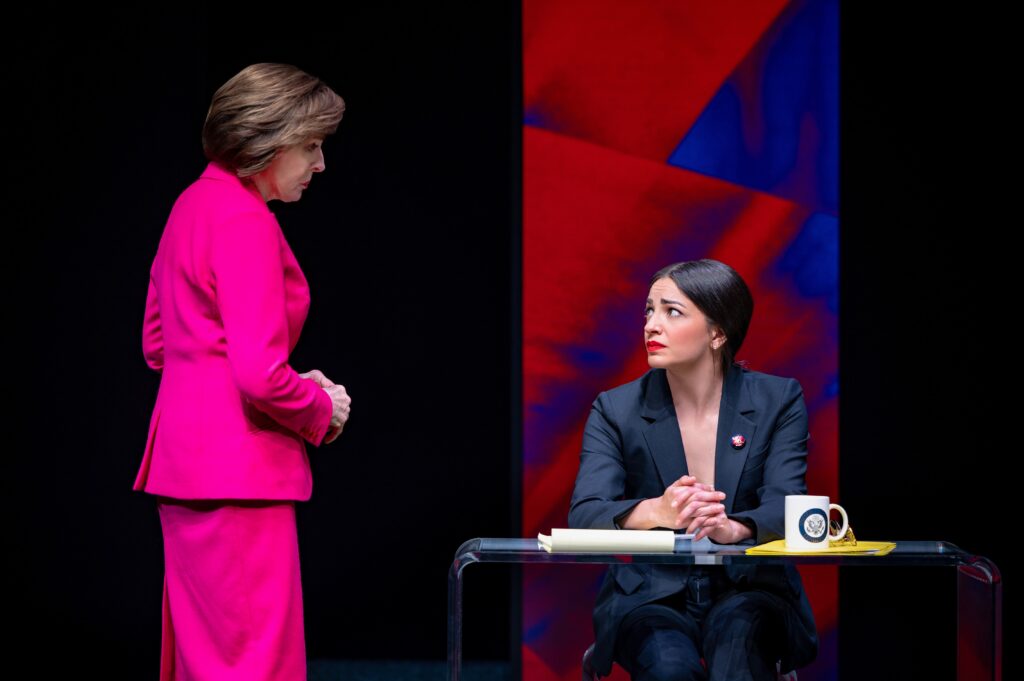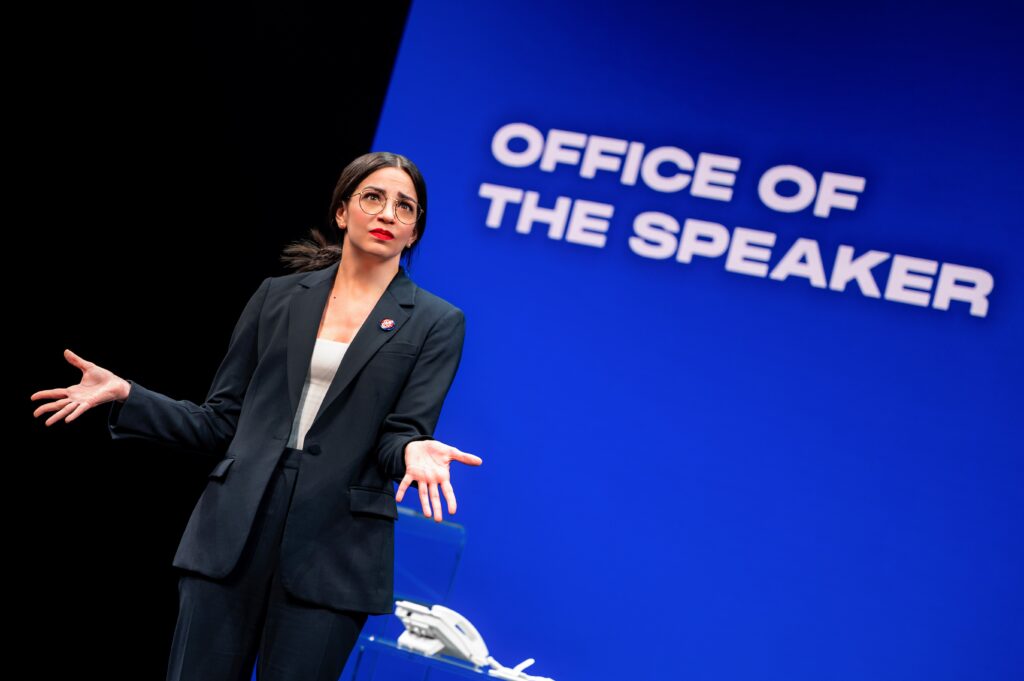N/A
In N/A written by Mario Correa (Tail! Spin!), N (Holland Taylor) and A (Ana Villafañe) go head to head sparking conflict in a tightly written work. The stakes are high in this world premiere directed by Diane Paulus (Jagged Little Pill). Both women want something from each other, though they perceive each other as adversaries. Will they relent and move toward each other or retreat? N/A poses intricate problems and answers them in a cool 80 minutes with no intermission. This “special event” runs at Lincoln Center’s Mitzi E. Newhouse Theater until August 4th.
How N and A use their powers of logic, persuasion, and mental acumen determines their success and forward momentum. Correa’s “new play” scores conversations of one of the most powerful and effective United States politicians of all time. As she vies for the Speakership, she must engage her antagonist and button down her vote. Bristling with antipathy, the youngest woman to be elected to the House of Representatives challenges the woman five decades her senior. Why vote for a woman who represents the status quo and establishment? This is especially burdensome since her constituents elected her as a progressive, reform candidate.

Inspired by True Events from 2018 through 2022
Inspired by true events from 2018 through 2022, Correa explores the thrust and parry that often plays out between wisdom and youth. As N (Nancy Pelosi) and A (Alexandria Ocasio Cortez) stir up the Democratic party, they confront a dangerous president. Though we don’t see the former president as a character, N speaks of him humorously and warily. In this two-hander, N strategically uses the harm he represents to turn around A’s adversarial position.
Always looking at the number 218, N schools A about the congressional numbers game of creating and passing viable bills. N talks consensus, unity, practicality. She knocks down A’s mythology about N’s familial privilege. She reminds A of their commonality. As an immigrant, N understands the language of insults, with her family referred to as “wops” and “dagos.” However, A dismisses N’s charm and condemns N’s status quo approach. A continually pushes her progressive, reform agenda.
During the course of the play, N references sub rosa, the power of the Republican Party. and the president. On Twitter and elsewhere, 45 challenges both woman in an attempt to divide and conquer. With one, he pretends she doesn’t exist. And the other he tweets, brands, and insults as a dangerous, left-wing, radical communist. Though Correa places the defamation sparingly in the background, at times A mentions being targeted to draw a comparison with N’s status. From A’s perspective N’s political trolling by Republicans drips “white privilege.” A’s defamation by Trump as one of the “squad,” screams racism and immigrant inferiority. With circumspection, A suggests the political opponents and president demean her “personhood.”
For N, the party can only be strong if it remains unified. Thus, A must “turn the page,” and grow hardened as N has. But A perceives weakness in a party caught in a foul, corrupt, broken system that no longer functions for the people. N recognizes the vulnerability of disagreement within the party. Since the opponents note all the votes, they magnify the split votes and publicize that the Democrats consume each other with divisiveness. This tactic works to further divide the party.

From N’s Perspective A Must be on the “Team”
If A only considers herself and not the “team,” she leaves the caucus open to ridicule and media attacks, trolling, and targeting. N suggests that A brings the targeting on herself with her loud, angry voice of protest. Throughout their conversations, N tries to help A understand “the work.” She reminds her the extent to which the president is “God-awful,” and “a calamity for the nation.”
Despite the irrational and ill-conceived mandates by the president, who N likens to a “cancer,” his party supports his every abnormal act. They “wink at” the abuse of his oath of office. With negativity and nihilism, 45 bullies his party to follow him without question. In N’s determination he “destroys the country.” N’s intentions for her caucus is to demonstrate unity or lose the House in the next election. Sacrificially willing to confront the “nightmare” of congress as their nemesis, with A’s deciding vote, N plans to rise to the challenge.
However, if A persists in folly and Democrats remain divided, N assures her they lose any possible power they have. Of course, that translates to no good work done “for the children,” N’s associative meme that defines her mission.
Taylor and Villafañe’s Characters are Shaped by Moral Imperatives
With these dynamic moral imperatives behind their characters, Taylor (Ann) and Villafañe’s (On Your Feet!) powerful sparring mesmerizes. With ready replies and crystal clear feedback, they keep the audience engaged. At times one could hear a pin drop. Other times the audience brought down the house to applaud “Nancy’s” fight for healthcare when 45 and his aides nearly gave up.
The playwright’s spare dialogue moves swiftly thanks to the Paulus’ pace, perfect for Taylor’s spot-on delivery of quips and witticisms. One picks up information not necessarily known as N reviews the strides made for women in congress on her watch. For example, she made sure they installed equivalent ladies bathrooms when none existed during her first Speakership. And she pushed for the pants suit A wears and banned the smoking of cigars in the chamber.
Taken from known dialogue and conversations, Correa’s play lightly imagines various meetings between N and A. Their crisp, humorous philosophical and ideological exchanges solidify antithetical perspectives. For N, results strike at the heart of legislative power. On the other hand, A voices her electorate’s progressive mandate like a studied activist honing her power dynamic.

An Important Moment of the Play
One of the important moments of the play comes when A criticizes the party’s watered down compromises on the climate crisis. Then, adamantly, with near hostility, she challenges N’s acceptance of the recent immigration bill. Opposing it and intending to eliminate ICE instead, A disputes the money given to the reprobate agency. She directs her anger at the system and N’s “complicit” attitude.
A’s constituents expect her to protest. However, when A labels ICE agents as “gestapo,” N calls her out. Though N shares A’s concern over the reported rapes, nine deaths, and the brutality of kids in cages, A refuses to hear her platitudes. For A, N’s agreement belies the situation which demands another outcome. N counters that both parties accepted the bill which shows results and which 45 signed into law. Something is better than nothing “for the children.”
In one of the most heartfelt and poignant scenes, Taylor and Villafañe strike fire by recalling the trying, horrific moments of 45’s family separation policy. The playwright weighs the arguments of both women with equal balance up to a point. However, ICE’s unacceptable abuse of migrants, and their online Facebook posts that A reads, appall the women and the audience. When N counters, “We will lose this Majority if you continue to undermine your own Caucus!” A replies that voting against the bill gave both of them “clarity.”
Playwright Correa Draws on His Own Experience as a Congressional Aide
Correa, once a congressional aide to Ambassador Constance A. Morella, draws on his experience decades prior in a very different time on Capitol Hill. His characters’ dialogue, brought to life by these sterling actresses, resonates with power and momentum. Holland’s N, with wit, irony, and great good will, faces any challenge undaunted by fear. That A goes toe to toe with her, every inch as talented and dynamic and passionate, reveals the woman behind the GOP lies.
The playwright avoids dealing with the COVID-19 crisis. The two actors wear no masks to even suggest 45’s disastrous COVID botch job. Correa does include the insurrection and both N and A discuss the likelihood that if found, the insurrectionists would have murdered them. Paulus indicates this through Sun Hee Kil’s sound design of the rioter’s mayhem. Lighting designer Mextly Couzin’s appropriate black out follows after the fearful noise.
With stylistic minimalism the actors navigate Paulus’ staging. Clear boxes represent chairs and desks (Myung Hee Cho’s scenic design). And Taylor and Villafañe, dressed in iconic and characteristic suits, stalk about in their heels. They sit and stand as they emphasize various points. Possible Lisa Renkel’s projection design fills in when appropriate.
This production is a must-see for the performances, the riveting conflict, the acute dialogue, and incisive pacing and direction. N/A runs with no intermission at Mitzi E. Newhouse Theater, Lincoln Center. https://www.lct.org/shows/na-the-play/
 Blogcritics The critical lens on today's culture & entertainment
Blogcritics The critical lens on today's culture & entertainment




